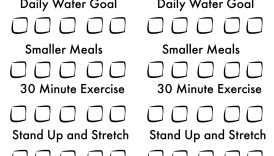How EatingWell Can Transform Your Lifestyle

Eating well is more than just a trend; it’s a lifestyle choice with profound implications for both mental and physical health. Embracing a nutritious diet can lead to heightened energy levels, improved mood, and a reduced risk of chronic diseases.
- How EatingWell Can Transform Your Lifestyle
- The Journey to Better Health
- The Importance of EatingWell
- Mental Health Benefits
- Physical Health Benefits
- Building a Balanced Diet
- Incorporating Fruits and Vegetables
- Choosing Whole Grains
- Healthy Eating Habits
- Portion Control
- Avoiding Processed Foods
- Meal Planning and Preparation
- Tips for Meal Prepping
- Quick and Easy Recipes
- Mindful Eating Practices
- Listening to Your Body's Hunger Cues
- Practicing Gratitude
- EatingWell on a Budget
- Smart Grocery Shopping
- Affordable Healthy Recipes
- Staying Consistent with Your Diet
- Setting Realistic Goals
- Finding Support from Others
- The Long-Term Effects of EatingWell
- Physical Health Benefits
- Mental Health Improvements
- Conclusion
- Key Takeaways
The Journey to Better Health
Many people struggle with their eating habits, often overwhelmed by conflicting information about what constitutes a healthy diet. For instance, a close friend of mine decided to overhaul his eating habits after feeling sluggish for months. He discovered that with simple changes, like adding more fruits to his breakfast and swapping white bread for whole grain, he could feel significantly more energized and focused throughout the day.
- Eating well can lead to:
- Increased energy levels
- Improved digestion
- Better sleep patterns
- Enhanced mood and mental clarity
This journey towards healthier eating may seem daunting at first, but with the right guidance and a positive mindset, it can become an enjoyable adventure toward better overall wellness.
The Importance of EatingWell
When it comes to the significance of eating well, the benefits ripple through every aspect of life, especially mental and physical health. By making mindful food choices, individuals can enhance their well-being significantly.
Mental Health Benefits
Eating a balanced diet is closely linked to mental health. Nutrient-rich foods can boost brain function and mood. For example, incorporating omega-3 fatty acids found in fish has been shown to reduce anxiety and depression. Personal experience backs this; after aligning my diet with more colorful vegetables and whole foods, I noticed an uplift in my overall mood—almost like a fog had lifted.
- Key mental health benefits include:
- Reduced anxiety and depression
- Enhanced focus and cognitive function
- Better stress management
Physical Health Benefits
On the physical side, a healthy diet supports the body in myriad ways. It helps maintain a healthy weight, strengthens the immune system, and can even stave off chronic diseases.
- Benefits of physical health improvements:
- Lower risk of heart disease
- Improved digestive health
- Increased energy levels
By prioritizing nutritious foods, individuals can unlock a transformative lifestyle that benefits both mind and body.
Building a Balanced Diet
Having established the critical mental and physical health benefits of eating well, it’s time to focus on how to build a balanced diet. This can seem overwhelming at first, but incorporating fruits, vegetables, and whole grains can seamlessly transform your meals.
Incorporating Fruits and Vegetables
Fruits and vegetables are the stars of a healthy diet; they are packed with vitamins, minerals, and antioxidants. A personal favorite of mine is adding a colorful fruit salad to breakfast each day. Not only does it brighten up my morning, but it also ensures I start the day with essential nutrients.
- Tips for incorporating more fruits and vegetables:
- Aim for at least 5 servings per day
- Experiment with smoothies to combine various fruits and veggies
- Opt for seasonal produce for better flavor and nutrition
Choosing Whole Grains
When it comes to grains, choosing whole grains provides lasting energy and essential fiber. Swapping white bread with whole grain options or reaching for brown rice instead of white can make a significant difference.
- Benefits of whole grains:
- Improved digestion
- Lower risk of heart disease
- Enhanced satiety, leading to better portion control
Building a balanced diet doesn’t have to be daunting. By focusing on these foundational components, anyone can lay the groundwork for a healthier lifestyle.
Healthy Eating Habits
As we continue to explore the building blocks of a balanced diet, establishing healthy eating habits is essential. Two pivotal aspects of this journey are portion control and avoiding processed foods.
Portion Control
Understanding portion sizes can be a game-changer when it comes to maintaining a healthy diet. Personally, I’ve found that using smaller plates helps to visually trick my brain into feeling satisfied with less food. It’s amazing what a simple change in dish size can achieve!
- Tips for effective portion control:
- Use measuring cups or a food scale for accuracy
- Fill half your plate with vegetables before adding other foods
- Listen to your body’s hunger cues and stop eating when satisfied
Avoiding Processed Foods
Processed foods can often be high in sugar, unhealthy fats, and sodium, making it crucial to limit their intake. I remember the difference I felt when I cut out most processed snacks, opting instead for fresh fruits, nuts, or homemade energy bars.
- Benefits of avoiding processed foods:
- Better control over ingredients
- Improved energy levels
- Enhanced overall health
By focusing on these healthy eating habits, individuals can make strides toward achieving their wellness goals, promoting mindfulness in every meal.
Meal Planning and Preparation
With a foundation of healthy eating habits in place, diving into meal planning and preparation can streamline your dietary journey. This not only saves time but also helps maintain the choices you’ve committed to.
Tips for Meal Prepping
Meal prepping can seem a bit daunting at first, but it’s become one of my favorite Sunday rituals. Dedicating a few hours to prepare meals for the week can eliminate afternoon snack temptations and hastily thrown-together dinners.
- Effective meal prepping tips:
- Choose a consistent day each week for meal prep.
- Invest in high-quality storage containers to keep food fresh.
- Keep it simple: cook in batches and use versatile ingredients.
Quick and Easy Recipes
Finding quick and nutritious recipes is essential for busy schedules. One of my go-to meals is a quinoa salad loaded with mixed veggies, chickpeas, and a simple lemon vinaigrette—ready in under 30 minutes!
- Quick recipe ideas:
- Overnight oats with fruits and nuts
- Stir-fried vegetables with lean protein
- Greek yogurt parfaits topped with granola
By embracing meal planning and preparation, anyone can foster healthier eating while saving time and stress throughout the week.
Mindful Eating Practices
Having embraced the art of meal planning and preparation, the next step towards a healthier lifestyle involves incorporating mindful eating practices. These practices can help foster a deeper connection with the food you consume.
Listening to Your Body’s Hunger Cues
One of the most transformative experiences in my journey was learning to listen to my body’s hunger cues. Initially, I would eat out of habit or boredom, but now I focus on recognizing genuine hunger signals.
- Tips for listening to hunger cues:
- Wait 10-15 minutes after feeling hungry before eating to assess your true need for food.
- Rate your hunger on a scale from 1 to 10 to help inform your decision to eat.
- Pay attention to emotions; differentiate between emotional and physical hunger.
Practicing Gratitude
Another vital aspect of mindful eating is practicing gratitude. Taking a moment before meals to acknowledge where your food comes from not only deepens your appreciation but can create a more respectful relationship with what you consume.
- Ways to practice gratitude:
- Pause and express thanks for the meal before you begin.
- Consider the farmers, chefs, and others involved in bringing the food to your plate.
- Reflect on how food nourishes your body and fuels your activities.
By integrating these mindful eating practices, individuals can cultivate a more intentional and enriching experience around their meals.
EatingWell on a Budget
Transitioning to healthier eating doesn’t have to break the bank. With some strategic planning, anyone can enjoy nutritious meals while keeping finances in check.
Smart Grocery Shopping
I remember the first time I tried to overhaul my grocery shopping habits. Instead of wandering the aisles aimlessly, I focused on making a detailed shopping list based on planned meals. This not only saved me money but also reduced food waste.
- Tips for smart grocery shopping:
- Shop with a list and stick to it to avoid impulse buys.
- Buy in bulk for non-perishable items like grains and legumes.
- Take advantage of seasonal produce for better prices and freshness.
Affordable Healthy Recipes
Cooking at home is another effective way to eat well on a budget. Simple, wholesome recipes can be both delicious and cost-effective. One of my favorite budget-friendly meals is a hearty vegetable soup that utilizes leftover produce.
- Affordable recipe ideas:
- Bean chili with canned beans and tomatoes
- Stir-fried rice with mixed vegetables and an egg
- Oatmeal topped with fruit and a sprinkle of nuts
By incorporating smart grocery shopping techniques and focusing on affordable recipes, anyone can maintain a healthy and budget-friendly diet without sacrificing flavor or nutrition.
Staying Consistent with Your Diet
With the tools for eating well on a budget in place, the next essential step is maintaining consistency in your dietary choices. This journey is all about creating sustainable habits that fit your lifestyle.
Setting Realistic Goals
One crucial component of consistency is setting achievable goals. Early in my healthy eating journey, I made the mistake of setting overly ambitious targets. After experiencing burnout, I learned the importance of starting small and gradually building up.
- Tips for setting realistic goals:
- Aim for gradual changes, like adding one more serving of vegetables each week.
- Break large goals into smaller, manageable milestones (e.g., cooking at home three times a week).
- Celebrate small victories to keep motivation high.
Finding Support from Others
Connecting with others can also significantly bolster your commitment. Joining a community, whether online or offline, can provide encouragement and accountability. I found a local food group where members share recipes and meal prep ideas, which has been incredibly motivating.
- Ways to find support:
- Join online forums or local groups focused on healthy eating.
- Share your goals with friends or family to foster a support system.
- Consider meal planning and prep sessions with a friend for added motivation.
By focusing on realistic goal-setting and seeking social support, individuals can navigate the challenge of staying consistent with their diet, making healthy eating a sustainable part of life.
The Long-Term Effects of EatingWell
Having explored how to stay consistent with a healthy diet, it’s important to emphasize the long-term effects of eating well. Establishing and maintaining nutritious eating habits can lead to transformative changes in both body and mind over time.
Physical Health Benefits
One of the most notable impacts of a well-balanced diet is improved physical health. For instance, after several months of prioritizing whole foods and reducing processed options, I noticed increased stamina and an overall reduction in common colds.
- Long-term physical health benefits include:
- Lower risk of chronic diseases like heart disease and diabetes
- Better weight management
- Enhanced immune function
Mental Health Improvements
Equally significant are the mental health benefits. A nutritious diet can enhance mood stability and cognitive function. I’ve experienced improved concentration and a greater sense of well-being since making healthier dietary choices.
- Lasting mental health effects:
- Reduced anxiety and depressive symptoms
- Increased energy levels and vitality
- Greater emotional regulation
By committing to healthy eating, individuals can enjoy not just immediate rewards, but also substantial long-term health benefits, enriching their overall quality of life.
Conclusion
Reflecting on this journey through the world of healthy eating, it becomes evident that adopting a nutritious diet is a powerful choice with far-reaching effects. From the importance of understanding what to eat to practical tips for staying consistent, every step matters.
Key Takeaways
Through this exploration, several vital points stand out:
- Mindful Choices: Listening to your body’s hunger cues and practicing gratitude can deeply enhance your eating experience.
- Sustainable Habits: Setting realistic goals and finding support from others can help maintain consistency in your diet.
- Long-Term Benefits: The physical and mental health benefits gained from healthy eating can significantly improve your quality of life.
As I’ve experienced firsthand, the path to eating well doesn’t need to be overwhelming. Embracing these principles can lead to a more vibrant, fulfilling life, one delicious meal at a time. Remember, it’s all about progress, not perfection. Your journey toward better health starts with the small, everyday choices you make.





